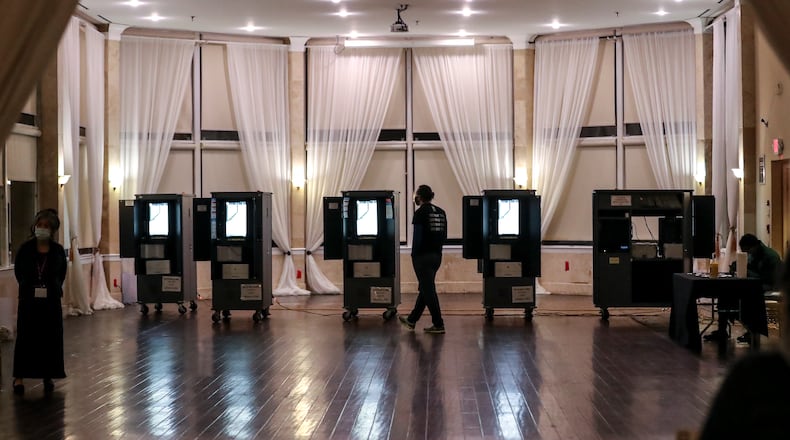A federal judge denied an effort to invalidate parts of Georgia’s voting law Wednesday, the first court ruling upholding new rules passed after last year’s elections.
U.S. District Judge J.P. Boulee wrote in his order that he wouldn’t “change the law in the ninth inning” amid ongoing runoffs for the state House. Boulee reserved judgment about future elections.
The lawsuit by the Coalition for Good Governance, an election security organization, opposed new requirements that voters request absentee ballots at least 11 days before election day, a deadline that limited the time available to vote by mail in the runoffs. The case also asked for court intervention to prevent restrictions on election observation.
“Election administrators have prepared to implement the challenged rules, have implemented them at least to some extent and now would have to grapple with a different set of rules in the middle of the election,” Boulee wrote in an 11-page order. “The risk of disrupting the administration of an ongoing election ... outweigh the alleged harm to plaintiffs at this time.”
The plaintiffs had sought an injunction to halt enforcement of the voting law, Senate Bill 202, which Gov. Brian Kemp signed March 25.
Though Boulee ruled against the plaintiffs’ request for immediate action, the underlying lawsuit against Georgia’s voting law remains pending in federal court.
The case is different from the voting rights litigation filed last month by the U.S. Department of Justice that opposes voter ID requirements, ballot drop box limits, provisional ballot rejections and a ban on volunteers handing out food and water to voters waiting in line.
This lawsuit, one of eight filed against the voting law, opposed prohibitions on observing voters casting ballots on brightly lit touchscreens, reporting problems to anyone but election officials, estimating absentee ballots cast and photographing voted ballots.
“This is just another in the line of frivolous lawsuits against Georgia’s election law based on misinformation and lies. We will continue to meet them and beat them in court,” Secretary of State Brad Raffensperger said.
Marilyn Marks, executive director of the Coalition for Good Governance, said the voting law endangers election transparency and integrity. She will continue to ask the courts to step in before municipal and special elections this fall.
“We’re concerned about the voter confusion that will no doubt occur with these little-known rapid changes to the rules, including the required information on ballot applications and the short deadline for applications to be received in this last week before the election,” Marks said.
The judge’s order relied on a U.S. Supreme Court ruling that said courts generally shouldn’t change existing rules when elections are imminent. Known as the Purcell principle, based on the 2006 case Purcell v. Gonzalez, the court found that altering election rules could bewilder voters and discourage them from participating.
Early voting is underway for two state House elections that will conclude on election day Tuesday.
In Cobb County, Republican Devan Seabaugh faces Democrat Priscilla Smith in a contest to replace former state Rep. Bert Reeves, a Republican from Marietta who resigned to take a job at Georgia Tech.
In a South Georgia race, Republicans Leesa Hagan and Wally Sapp are seeking the seat of former state Rep. Greg Morris, a Republican from Vidalia who will serve on the State Transportation Board.
What’s next
Eight lawsuits are pending against Georgia’s new election law in federal court. They have all been assigned to U.S. District Judge J.P. Boulee, who ruled against a request to immediately intervene in one of the lawsuits. The underlying case is still pending. It could take years for the cases to work their way through the federal court system.
Contested parts of Georgia voting law
Observation limits: Anyone who intentionally observes a voter while casting a ballot in a way that would allow that person to see how a voter is voting could face felony charges.
Gag rule: Election monitors and observers can’t communicate any information they see from the processing and scanning of absentee ballots to anyone except election officials.
Estimation ban: Election monitors and observers aren’t allowed to estimate the number of absentee ballots cast.
Photography restrictions: Photography of voted ballots isn’t allowed.
Application deadline: Voters must request absentee ballots at least 11 days before election day.
Source: Senate Bill 202
About the Author
Keep Reading
The Latest
Featured




